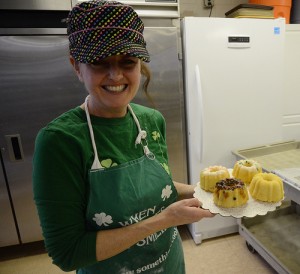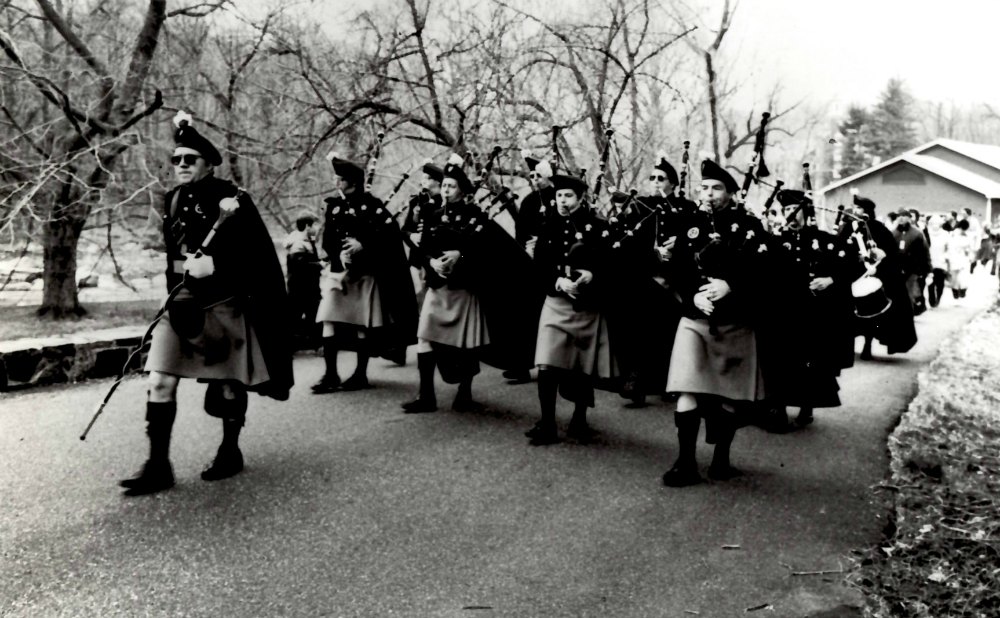 Inside the Paoli Presbyterian Church kitchen, the air is heavy with the sweet scent of vanilla, orange and chocolate. Easy listening music blares from a boom box in one corner of the room, and in another corner, the industrial-sized twin Blodgett convection ovens emit a low roar.
Inside the Paoli Presbyterian Church kitchen, the air is heavy with the sweet scent of vanilla, orange and chocolate. Easy listening music blares from a boom box in one corner of the room, and in another corner, the industrial-sized twin Blodgett convection ovens emit a low roar.
Perched on cooling racks near an open screen door rest close to two dozen four-inch bundt cakes, a big 10-inch granddaddy bundt, and a coffee table-sized sheet cake. These tantalizing golden-brown confections are the result of a couple of hours’ labor by the exceptionally well organized Deborah Streeter-Davitt, the self-described “head caketress” behind MacDougall’s Irish Victory Cakes. She has help from her father, the Rev. Richard Streeter. (A former pastor of the church, he describes his role in the enterprise as “chief orange squeezer.”)
You might have seen, and tasted, Streeter-Davitt’s handiwork at a local Celtic festival. Her cakes are also available in more than a dozen small markets and farmers’ markets throughout the Delaware Valley. They’re also available online.
The success of MacDougall’s Irish Victory Cakes marks a kind of victory for Streeter-Davitt, who pursued a dream and became a baker following a layoff about three years ago from her longtime job in the financial services industry.
“Necessity breeds creativity,” laughs Streeter-Davitt, who seems not to break a sweat in the 80 degree-plus commercial kitchen, which she rents on Tuesdays and Thursdays from the church. (A local biscotti maker also leases the space.) Her green apron bears the imprint of floury hands. and she tucks her dark, wavy hair into a little heart-decorated painter’s cap, from which an uncooperative loose tendril escapes. Whisking flour and sugar into eggs, melting and stirring chocolate, scooping yellowy batter into heavyweight Nordic Ware pans, manhandling sheet cake pans into the oven, Streeter-Davitt seems the very picture of contentment.
The work consumes many more hours than she was used to devoting to her previous profession, but for Streeter-Davitt, it’s all worthwhile.
The layoff coincided with another imminent turning point in her life. “I was turning 50 in a few years, and I thought … hmmmmmmm. That was two and a half years ago. Up to that point, there was always something missing. Salary and travel all over the United States couldn’t fill that hole. I didn’t realize how fulfilling this would be. Now, I feel like I’m doing something I’m meant to be doing.”
Streeter-Davitt has been baking since the ‘80s. She says that’s when she came into possession of a recipe for a simple but rich, dense, buttery cake. The recipe belonged to her great-grandfather James MacDowell (of the MacDougall Clan) from Belfast. Before World War I, MacDowell had gained no small measure of fame for his delicious, lavishly decorated cakes. He baked for kings and queens. Just after the war, he left his fame behind and moved to the Syracuse, N.Y. area, where he toiled away in a tiny, neighborhood bakery. MacDowell decorated cakes for all the local wealthy households—all so his grandkids would have the opportunity for an education.
MacDowell’s story is the “victory” in the victory cake, says Streeter-Davitt. “It was his victory to bring the family here to the United States. He was a famous champion baker back home, but he gave it all up for his children and grandchildren.”
Streeter-Davitt, for her part, has taken some liberties with the basic butter cake recipe. She adapted the base recipe to create several distinctive, and distinctively named, flavors, from Dassie’s Traditional (with Wilbur chocolate and butterscotch chips) to Skeeter’s Grand Slam (chocolate, butterscotch, peanut butter and marshmallow) to Albie’s Loopy Leprechaun (chocolate, butterscotch and “two cheers of whiskey”). Many of the ingredients are local, and all cakes include at least a kiss of whiskey.
When the local appetite for Victory Cakes is at its greatest, it’s all hands on deck—mostly meaning “relatives, and friends of relatives.” It’s a huge amount of work, baking cakes in large quantities. For a batch, think in terms of two dozen eggs, a pound of butter, a pound of sour cream, five pounds of flour, and six cups of sugar. (And there are a few secret ingredients in the mix that make the cake deliciously different.)
St. Patrick’s Day, of course, is a major undertaking. “We probably made close to 800 minis (the four-inch individual cakes), 150 petites (the two-pound cake), and 20 mighties (the five-pounder),” Streeter-Davitt says.
Baking, she adds, is only half of the job. There’s frosting and decorating, wrapping and labeling, transporting, marketing and more. Yeoman’s labor, but all infinitely worthwhile to MacDougall’s energetic head caketress, both on a professional and a personal level.
“What’s fun about this job is that I get to work with my dad, and carry on his granddad’s legacy. You can’t put a price tag on that.”
More info:
610-608-6889
macdougallscakes@aol.com
www.macdougallscakes.com
PO Box 563 Malvern, PA 19355

